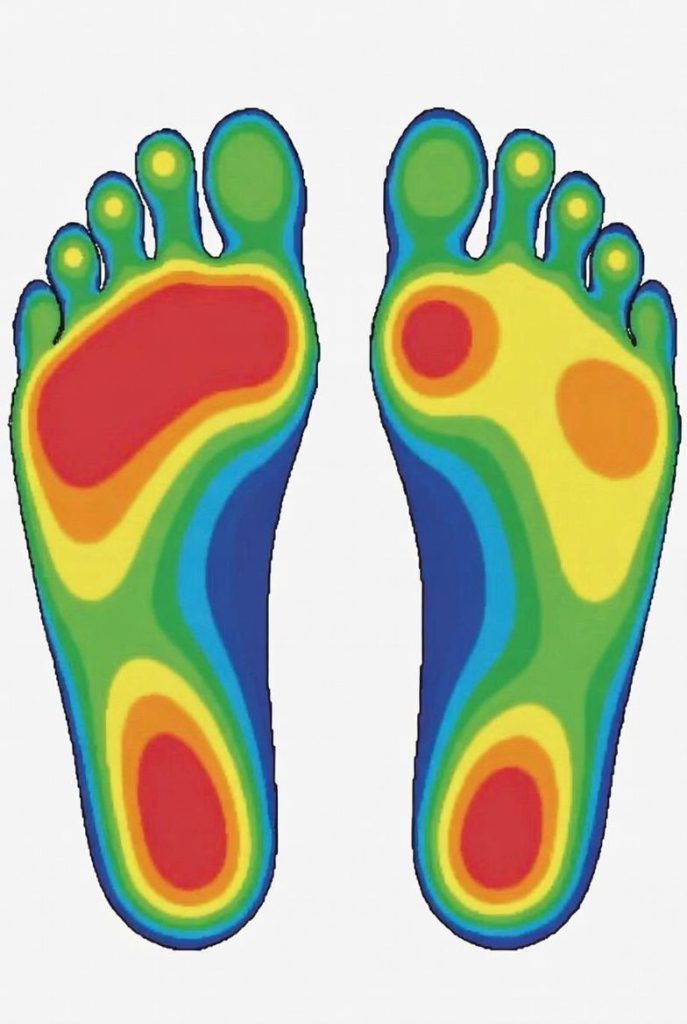Did you know that the average pair of shoe insoles loses up to 50% of its cushioning and support within a year of regular use? Footwear plays a critical role in maintaining proper posture, distributing weight, and absorbing shock. When insoles wear down, the consequences can extend beyond sore feet, affecting ankles, knees, and even lower back alignment.
Repairing shoe insoles can help prevent these problems before they become serious. Professional services that repair shoe insoles use scientific methods to restore support, reshape cushioning, and realign pressure points. By addressing worn areas, these repairs can maintain correct foot biomechanics, helping to reduce discomfort and the risk of injuries caused by uneven gait or poor posture.
How Worn Insoles Affect Foot Biomechanics

image: Pressure distribution on the foot before and after insole repair
Foot biomechanics refers to the way your feet move and distribute weight while standing or walking. Insoles are designed to support arches, absorb shock, and stabilize the heel. Over time, repeated impact and pressure cause the materials to compress or shift. This change can lead to uneven weight distribution, causing the foot to roll inward or outward.
As a result, the entire kinetic chain, from the foot to the knees, hips, and lower back, may experience strain. Common consequences include plantar fasciitis, tendon irritation, and joint discomfort. Even subtle shifts in alignment can alter gait patterns, leading to chronic issues that are more difficult to treat than simply addressing worn insoles.
Just as recent research highlights in The Vital Role of Science in Advancing Physiotherapy: Bridging Evidence and Practice for Optimal Patient Outcomes, evidence-based interventions can make a tangible difference in daily comfort and long-term musculoskeletal health.
The Science Behind Repairing Insoles
Repairing insoles is more than replacing cushioning; it involves restoring structural integrity to support natural foot mechanics. Technicians assess the areas of highest pressure and identify spots where material has flattened or worn unevenly. Specialized materials are then used to reinforce the arch, heel, or forefoot, ensuring that weight is distributed correctly during each step.
Research in podiatry shows that restoring insole support can improve balance and reduce strain on ligaments and joints. By realigning the foot, repaired insoles reduce abnormal pressure on certain areas, minimizing the risk of blisters, calluses, and inflammation. Additionally, consistent support helps maintain proper posture, which can alleviate back and hip pain caused by compensatory movements.
Practical Benefits Beyond Comfort
Aside from biomechanical benefits, repairing insoles is a cost-effective alternative to full replacement. High-quality orthotic insoles can be expensive, and replacing them frequently adds up. Repairs extend the lifespan of your existing insoles while preserving their custom contours. This approach also supports sustainability by reducing waste and prolonging the life of shoes designed to fit your feet perfectly.
For athletes, people on their feet all day, or those with chronic conditions, repaired insoles provide consistent performance. Proper cushioning absorbs impact during exercise, walking, or standing, preventing fatigue and overuse injuries. Even casual wearers notice improved comfort during daily activities, demonstrating how small adjustments can have a significant effect on overall foot health.
Maintaining Foot Health Through Insole Care
Simple habits can help keep insoles functional for longer. Regularly inspecting for flattening, cracks, or uneven wear allows timely repairs. Avoid exposing shoes to excessive moisture or heat, which can degrade materials. Some people rotate multiple pairs of shoes to reduce continuous pressure on a single insole, while cleaning with gentle methods preserves cushioning.
Ultimately, investing in professional repair ensures that your feet continue to receive proper support. From correcting alignment to redistributing pressure, repaired insoles protect against long-term conditions that may affect joints, muscles, and posture. Taking care of your insoles is a practical step toward maintaining comfort and foot health every day. By choosing to repair rather than replace, you safeguard both your well-being and your budget.
Conclusion
When insoles are restored, the benefits are immediate and long-lasting. Proper support reduces strain, enhances comfort, and maintains natural biomechanics. Whether for daily wear, work, or athletic activity, repairing shoe insoles is a smart way to care for your feet and prevent chronic issues down the line.
By addressing worn areas and restoring structural support, you can preserve foot health, protect joints, and enjoy more comfortable movement. Investing in professional repair of your insoles is an accessible, cost-effective step that makes a measurable difference in posture, gait, and overall well-being.
Repair shoe insoles to maintain proper foot alignment and prevent long-term biomechanical problems, ensuring your daily steps remain comfortable and safe.




 According to the American College of Prosthodontists, more than 36 million Americans lose all their teeth before reaching their 50s. This rising demand for restorative and cosmetic care is fueling a new era of innovation in dentistry. Modern practitioners are moving far beyond basic fillings and extractions. They’re embracing advanced technology, evidence-based methods, and continuous training to deliver treatments that are comfortable, precise, and life-changing for their patients.
According to the American College of Prosthodontists, more than 36 million Americans lose all their teeth before reaching their 50s. This rising demand for restorative and cosmetic care is fueling a new era of innovation in dentistry. Modern practitioners are moving far beyond basic fillings and extractions. They’re embracing advanced technology, evidence-based methods, and continuous training to deliver treatments that are comfortable, precise, and life-changing for their patients.




 While discussions about body image issues often center on women, men face their own set of struggles—struggles that are less talked about but just as impactful. Male enhancers, marketed as solutions to perceived inadequacies, are a growing part of this conversation. But instead of boosting confidence, these products often exacerbate body dysmorphia and fuel unhealthy self-perception. Let’s dive into how the cultural obsession with physical perfection and reliance
While discussions about body image issues often center on women, men face their own set of struggles—struggles that are less talked about but just as impactful. Male enhancers, marketed as solutions to perceived inadequacies, are a growing part of this conversation. But instead of boosting confidence, these products often exacerbate body dysmorphia and fuel unhealthy self-perception. Let’s dive into how the cultural obsession with physical perfection and reliance 
 Below are recommendations from some Quora members who based their feedback on their personal experiences.
Below are recommendations from some Quora members who based their feedback on their personal experiences.
 The most well-known refractive treatment, LASIK is also called as Laser-Assisted In-Situ Keratomileusis. LASIK treatment aims to reshape the cornea through the destruction of the small tissue within the area.
The most well-known refractive treatment, LASIK is also called as Laser-Assisted In-Situ Keratomileusis. LASIK treatment aims to reshape the cornea through the destruction of the small tissue within the area.







